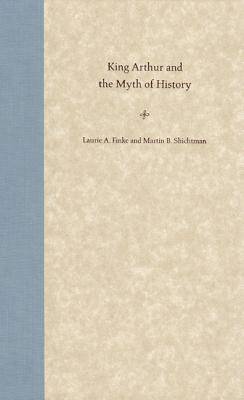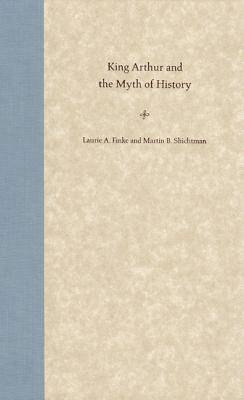
- Afhalen na 1 uur in een winkel met voorraad
- Gratis thuislevering in België vanaf € 30
- Ruim aanbod met 7 miljoen producten
- Afhalen na 1 uur in een winkel met voorraad
- Gratis thuislevering in België vanaf € 30
- Ruim aanbod met 7 miljoen producten
Omschrijving
"The few full-length studies of the Morte D'Arthur and other Arthurian texts published in the past 15 years have rarely reached and sustained the level of theoretical and interpretive sophistication found here. King Arthur and the Myth of History ought to have quite an impact on Arthurian studies, in part because Finke and Shichtman take medieval Arthurian literature--particularly what passes for history and chronicle--very seriously, on its own terms, in its different cultural contexts."--Kathleen Kelly, Northeastern University
King Arthur and the Myth of History considers why, in the 12th century, tales of a 6th-century British king who achieved immortality in an apparently hopeless struggle to repel Saxon invaders, suddenly emerged full blown, virtually from nowhere. Further, why did this figure from the margins of the Norman empire suddenly become an important subject of historical writing at the center of that empire, and why has he since continued to be an enduring cultural icon? Laurie Finke and Martin Shichtman contend that Arthur has been employed by historians as a potent but empty symbol to legitimize institutional political ambitions during times of social stress.
The study focuses on three periods of cultural crisis: the Norman colonization of England in the 11th and 12th centuries, the Warsof the Roses in the 15th century, and the rise and resurgence of fascism in 20th-century Europe. It examines four English chronicles of the Norman period--those of William of Malmesbury, Geoffrey of Monmouth, Wace, and Layamon. Other chapters investigate John Hardyng's Chronicle and Malory's Morte D'Arthur, both produced during the tumult of the Wars of the Roses. Finally, it considers more contemporary texts that offer the history of Adolf Hitler's acquisition of the Holy Grail: Jean-Michel Angebert's The Occult and the Third Reich: The Mystical Origins of Nazism and the Search for the Holy Grail and Trevor Ravenscroft's Spear of Destiny.
Finke and Shichtman argue that these texts reveal tensions between the claims that history makes about objectivity or referentiality and particular social, political, and ideological agendas. They demonstrate that at historical moments of great stress, the turn to antiquarianism, in an effort to bypass traumas of the recent past in favor of archaic origins, offers a unique opportunity for the literary and cultural theorists to investigate the aims and uses of history itself.
Laurie A. Finke is chair of the Women and Gender Studies Program at Kenyon College. Martin B. Shichtman is professor of English at Eastern Michigan University.
Specificaties
Betrokkenen
- Auteur(s):
- Uitgeverij:
Inhoud
- Aantal bladzijden:
- 288
- Taal:
- Engels
Eigenschappen
- Productcode (EAN):
- 9780813027333
- Verschijningsdatum:
- 30/06/2004
- Uitvoering:
- Hardcover
- Formaat:
- Genaaid
- Afmetingen:
- 158 mm x 236 mm
- Gewicht:
- 512 g

Alleen bij Standaard Boekhandel
Beoordelingen
We publiceren alleen reviews die voldoen aan de voorwaarden voor reviews. Bekijk onze voorwaarden voor reviews.











